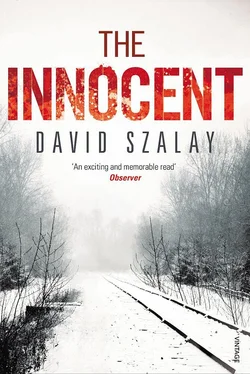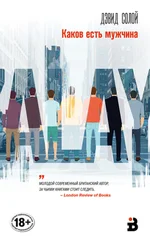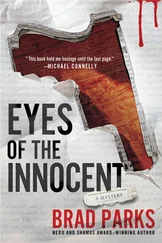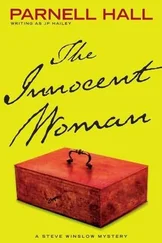Дэвид Салой - The Innocent
Здесь есть возможность читать онлайн «Дэвид Салой - The Innocent» весь текст электронной книги совершенно бесплатно (целиком полную версию без сокращений). В некоторых случаях можно слушать аудио, скачать через торрент в формате fb2 и присутствует краткое содержание. Город: London, Год выпуска: 2010, ISBN: 2010, Издательство: Vintage, Жанр: Проза, на английском языке. Описание произведения, (предисловие) а так же отзывы посетителей доступны на портале библиотеки ЛибКат.
- Название:The Innocent
- Автор:
- Издательство:Vintage
- Жанр:
- Год:2010
- Город:London
- ISBN:9781448103232
- Рейтинг книги:5 / 5. Голосов: 1
-
Избранное:Добавить в избранное
- Отзывы:
-
Ваша оценка:
- 100
- 1
- 2
- 3
- 4
- 5
The Innocent: краткое содержание, описание и аннотация
Предлагаем к чтению аннотацию, описание, краткое содержание или предисловие (зависит от того, что написал сам автор книги «The Innocent»). Если вы не нашли необходимую информацию о книге — напишите в комментариях, мы постараемся отыскать её.
The Innocent — читать онлайн бесплатно полную книгу (весь текст) целиком
Ниже представлен текст книги, разбитый по страницам. Система сохранения места последней прочитанной страницы, позволяет с удобством читать онлайн бесплатно книгу «The Innocent», без необходимости каждый раз заново искать на чём Вы остановились. Поставьте закладку, и сможете в любой момент перейти на страницу, на которой закончили чтение.
Интервал:
Закладка:
There were four sisters, and it was one of the others – he sometimes forgets this – with whom he was infatuated for several years in his teens. She was older than him, and when he heard of her engagement to an engine driver he thought his life was over. She went to live in Novosibirsk and he soon forgot her.
His first specific memory of Irina. She is wearing a white shift, like a nightdress. It is May Day, the parade. She has no shoes on and the soles of her feet are black. Her father was a shock-worker, and the family had their own flat in a new development near the machine factory, Uralmash. The development was designed by a famous German architect who inspected it one day, passing along the plain corridors in his Homberg, surrounded by officials. He stood in the living room of the flat, putting questions to Irina’s father through an interpreter. Irina was there, ignoring Aleksandr, who was ignoring her. What they did together was still a secret from her family. She had instigated it, one afternoon when they were alone in the flat. Unlike him, she was not a virgin.
In October he went to Moscow to study law at the OGPU Higher School. Everyone was impressed that he had won a place there. There was a party the night before he left, and in the morning she went with him to the station. No one had seen him off from a station since his mother, from the tiny wind-tousled platform at Basmanovo in 1924. Wet snow was falling, melting on the tall black locomotive. Wet feet left prints in the pale slush. He told her not to wait. She was wet and shivering. He kissed her the way he had seen people kissing in films – her face was numb – and settled himself in the train. Then, when it started to move, he heard her voice shouting ‘Sasha!’ and shoved down the window.
Sasha!
She was there, on the platform, trying to keep pace with the train. She had waited, and more than forty years later the sound of her voice is present to his mind with such untarnished precision that it seems it has only just stopped.
Sasha!
He stayed at the open window, with his face in the wind, until one of the other passengers – he had forgotten about them – told him to shut it. Which he did, and sat down wiping his eyes on his sleeve.
There was then, in 1930, a sense of excitement about everything. Following the slow, tactical twenties it seemed that the Revolution was finally under way, with the end of private manufacturing and trade, the industrialisation of the first Five Year Plan, the establishment of the kolkhoz system, and the formation of a new Soviet working-class intelligentsia, of which he was so proud to be a member. All these things seemed to be happening with a sudden unstoppable momentum, while the imperialist world staggered through the slump that would destroy its unjust economic structure.
Sinyavsky, the head of the OGPU Higher School, was addressing the students in the summer of 1932. It was the end of the university year, a hot June day. The sunny gymnasium was full of students in their white cadets’ uniforms. Sinyavsky, also in uniform, was unusually solemn. ‘The Civil War,’ he said, ‘did not end in 1921 – it did not end at all. It is well known that after their defeat many Whites, those who could not escape abroad, pretended to be Communists, and entered the state, party, and security services, especially in places far from Moscow. They never truly accepted their defeat, and they never lost their old loyalties. So among the millions of people who participated in the victorious struggle to overthrow the tsar, and who joined the Communist Party, there were, unfortunately, some who did so for reasons other than fighting for the proletariat and for Communism, and in time a number of these people found themselves in important positions in the party, the state and the armed forces.’ Sinyavsky paused, and surveyed the several hundred young, serious faces in front of him, among them Aleksandr’s, near the front, the wool of his uniform prickling his neck in the heat. ‘In the twenties,’ Sinyavsky went on, ‘they tried to achieve their ends through politics, these people, the Rightists. They even tried to take control of the party and its policies. They failed in this. Now they have turned to more desperate methods – to wrecking, violence, murder, terrorism. What they tried to achieve through politics in the past, they now try to achieve through violence. This is the new situation.’ They listened in sober silence while he listed the plots that had been foiled that year, all of them involving party members, some even members of the Central Committee. The Riutin conspiracy, the Eismont-Tolmachev-Smirnov conspiracy, Trotsky’s conspiracies with his supporters still in the USSR – such as Radek, Smilga and Preobrazhensky – and his letter to the Central Committee, written from his hiding place in Mexico, in which he explicitly threatened the Soviet state with terrorist violence.
He was always surprised, when he saw her for the first time from the still-just-moving train, waiting for him in the humid June air or the fog of December, how pretty she was. Her smile. Her slightly Asiatic eyes. Asiatic in shape – they were blue. It was somehow strange to see her there. The first time, he did not know what to expect. There was a sort of trepidation. They eyed each other like strangers on the icy platform. Kissed on the mouth with a sort of formality. They had written to each other – passionate, unwary letters – which only made it stranger to be warily face to face, pink-nosed, and not quite as they were in their memories of each other. Her eyes were watering in the frozen air. She laughed. ‘What?’ he said. It was mid-afternoon. She had left work early. The flat was empty and as soon as the door was shut they tumbled fumbling onto the floor. With her skirt around her waist she was still wearing her scarf, though her rabbit-skin hat had fallen off. They were lucky that the flat was empty – it was the school holidays and her grandmother had taken the younger siblings skating. There was a scarcity of solitude.
In summer, of course, there was outdoors. There was the path, usually unnoticed, to the side of the Uspenskaya Church, shrunk to little more than a parting in the vegetation, variegated with warm white blotches of sunlight. It led to a stream, which in turn flowed under foliage into the Iset a few kilometres south of the town, where, though wide, it slid in whispering shallows over stones.
In winter it was less easy to find places. Once they used the nightwatchman’s hut of a warehouse which was shut for the New Year holiday. The nightwatchman was her uncle, and was away for a few days. The weather was mild, unsettled, overcast. A midwinter thaw. Inside, the hut was filthy and extremely damp, infested with woodlice and spiders. In the night the sleet drummed on the old newspaper over the window. They slept pressed together in the valley of the mattress. In the morning there were human voices in the street outside.
In the suitcase under his bed, he finds the photograph of her which he took to Moscow – a smiling studio shot – in an old envelope. (On the envelope is written, in her handwriting, his name and the words, Feliks Dzerzhinsky Higher School, 48 Pelshe Street, Moscow . For a few moments he stares at those words. They are extraordinarily evocative, more so even than the photograph itself. They make him sigh tearfully. She had the elegant handwriting of the semi-educated. Her father, though a Communist, had old-fashioned ideas on subjects such as the education of women, and she left school at eleven. Her mother was illiterate.) There are other photographs in the envelope. The wedding photo from 1934, unframed, and stored as mere memor a bilia – he in his new NKVD lieutenant’s uniform, twenty-two years old, black-haired, staring into the camera with an intently serious expression. And Irina, smiling, holding her lilies. The photographer was striving for the tone of the silver screen, fussing with props and silk flowers. (Irina’s lilies were made of silk.) Aleksandr was impatient with him. The photographer understood what he was making though – understood that a wedding photo is not so much a memory as an idea. That it must transcend the the sharp toxic smells of the studio, the oppressive summer heat, the struggle of the fly on the skylight. That it is in fact a symbol of such transcendence, no less an instrument of faith than the sooty ikons of Aleksandr’s faint memories of his parents’ house, or the portraits of Lenin in every public place.
Читать дальшеИнтервал:
Закладка:
Похожие книги на «The Innocent»
Представляем Вашему вниманию похожие книги на «The Innocent» списком для выбора. Мы отобрали схожую по названию и смыслу литературу в надежде предоставить читателям больше вариантов отыскать новые, интересные, ещё непрочитанные произведения.
Обсуждение, отзывы о книге «The Innocent» и просто собственные мнения читателей. Оставьте ваши комментарии, напишите, что Вы думаете о произведении, его смысле или главных героях. Укажите что конкретно понравилось, а что нет, и почему Вы так считаете.












